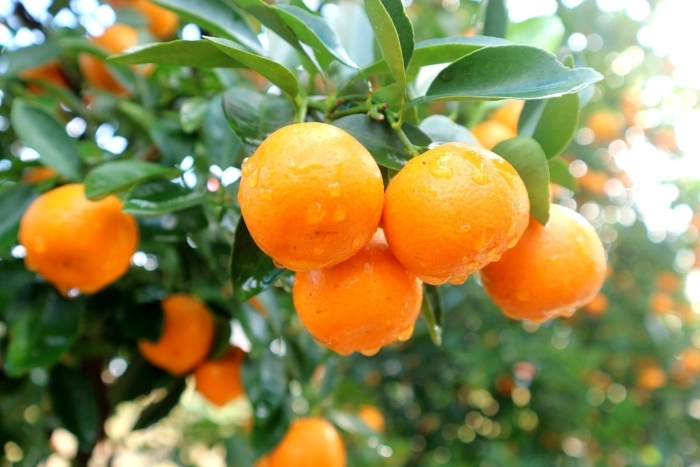Consuming around 4-5 kumquats daily provides over half of your necessary vitamin C intake.
Here are the main health benefits of kumquats:
1. Kumquats Support Blood Sugar Control
Kumquats have a low glycemic index (GI), helping to prevent sudden spikes in blood sugar levels after meals.
According to the American Diabetes Association (ADA), a high-fiber diet can slow down the absorption of sugar in the bloodstream, thus maintaining stable blood sugar levels.
A 100g serving of kumquats provides approximately 6.5g of fiber, meeting nearly 25% of the daily fiber requirement.
The soluble fiber in kumquats, particularly pectin, slows down carbohydrate digestion, preventing post-meal blood sugar spikes.
A study published in the American Journal of Clinical Nutrition (AJCN) also indicates that a fiber-rich diet can lower fasting blood sugar levels and improve insulin sensitivity in individuals with type 2 diabetes.

A 100g serving of kumquats provides approximately 6.5g of fiber.
2. Kumquats Are Rich in Antioxidants, Boosting Immunity
Kumquats are abundant in vitamins A and C, renowned for their antioxidant properties.
The antioxidants in kumquats can reduce oxidative stress caused by free radicals in the body. Drinking kumquat juice is an excellent way to detoxify your body.
According to a study, beta-cryptoxanthin and L-limonene in kumquats can enhance immune function. They achieve this by boosting the activity of natural killer cells and reducing metabolic stress in the body.
3. Kumquats Promote Cardiovascular Health
Diabetes increases the risk of cardiovascular disease due to lipid metabolism disorders and blood vessel damage.
Kumquats are rich in flavonoids and vitamin C, which protect the cardiovascular system by reducing inflammation and preventing the formation of arterial plaque.
Research from the American Heart Association (AHA) suggests that the vitamin C in kumquats improves blood vessel health and lowers blood pressure, reducing the risk of stroke and heart disease.
Flavonoids such as hesperidin and naringenin in kumquats help lower LDL (“bad”) cholesterol while increasing HDL (“good”) cholesterol, leading to better blood lipid control.
A 2018 study published in the Journal of Nutrition and Metabolism (JNM) found that flavonoid supplementation from citrus fruits, including kumquats, improved vascular inflammation and helped regulate blood pressure in diabetic patients.
4. Kumquats Exhibit Antibacterial Properties
A study indicates that oil extracted from kumquat peels may possess antibacterial qualities.
Consequently, it can inhibit the growth of harmful microorganisms, such as bacteria and fungi, on food items.
Due to its antibacterial effects, kumquat extract can extend the shelf life of food products by preventing the growth of microorganisms.

Kumquat peel extract exhibits antibacterial properties.
5. Kumquats Promote Eye Health
Kumquats contain a significant amount of vitamin A in the form of beta carotene. It is one of the 11 carotenoids found in kumquats.
Numerous studies have discovered that carotenoids like beta carotene, zeaxanthin, and lutein contribute to better eye health.
Our eyes contain a compound called rhodopsin, which enables us to see in low-light conditions. Inadequate rhodopsin production can lead to night blindness. Vitamin A is essential for the production of rhodopsin.
Thus, kumquats, rich in vitamin A, play a vital role in maintaining healthy vision.
6. Kumquats Aid in Weight Loss
Another flavonoid present in kumquats, called Poncirin, may play a significant role in preventing obesity.
A study suggests that Poncirin can reduce the risk of weight gain by inhibiting the formation of new fat cells in the body.
Additionally, kumquats are a good source of fiber. Since they move slowly through the digestive tract, they keep you feeling fuller for longer. They reduce cravings and the tendency to indulge in unhealthy snacks.
Kumquats are complex carbohydrates due to their reasonable fiber content. Consequently, they take longer to pass through the intestines as digestive enzymes cannot break them down. Fiber passes through the digestive tract without being digested by enzymes produced in the stomach.
Therefore, a high-fiber diet helps you feel fuller for extended periods, reducing cravings and preventing weight gain.
Who Should Avoid Eating Bitter Melon (Bitter Gourd)?
Bitter melon, also known as bitter gourd, is a vegetable with potent health benefits. While it may not appeal to everyone’s palate due to its distinct bitter taste, it is a nutritional powerhouse packed with vitamins and minerals. This humble vegetable has gained recognition in the health and wellness sphere for its potential to promote overall wellbeing.
The Ultimate ‘Natural Cleanse’: Two Fruits from Vietnam with Minimal Pesticides, Delicious Taste, and Nutritional Benefits Worth Discovering
Uncover the two ‘treasures’ grown in Vietnamese gardens, renowned for their cultivation process that almost eliminates the need for pesticides. Not only do they boast delicious, naturally sweet flavors, but they are also packed with essential nutrients, offering a bountiful supply of goodness for your body.
3 Natural Waters That Are a ‘Sunscreen’ and Skin Brighteners: A Secret to Many Asian Beauties’ Radiance
“In addition to safeguarding your skin with sunscreen, you can also incorporate skin-benefiting beverages into your routine. These drinks offer a dual benefit of protecting your skin against harmful UV rays and promoting skin whitening from within. Imagine sipping your way to a radiant, youthful complexion. It’s time to unlock the power of these drinks and embrace a holistic approach to skincare.”





































